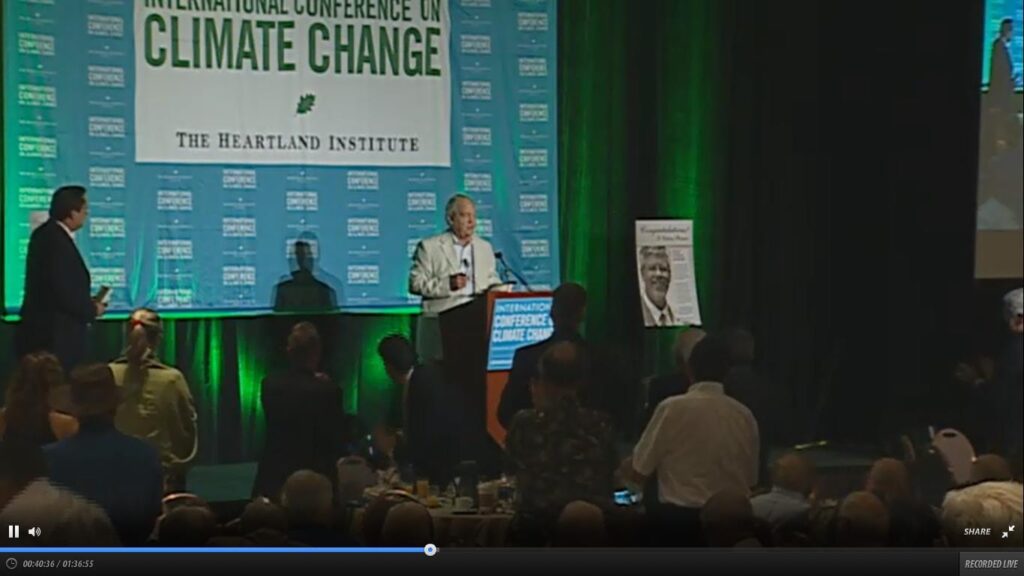Attendees of The Heartland Institute’s 9th International Conference on Climate Change held in Las Vegas from July 7-9, “Just Don’t Wonder About Global Warming, Understand It,” heard some of the world’s leading climate scientists and researchers discuss the latest state of global warming science, including questions of whether manmade global warming will harm plants, animals, or human welfare. Eight hundred participants gathered to hear 64 speakers from 12 different countries despite the fierce summer heat of Las Vegas. At one point 4,000 individuals were listening to the conference as it was streamed live from Las Vegas.
Speakers addressed myths of climate alarmism, specifically refuting the often-repeated assertion that 97 percent of scientists disagree with so-called global warming skeptics. On the contrary, speakers noted, only 0.5 percent of the authors of 11,944 scientific papers on climate and related topics over the past 21 years have said they agree most of the warming since 1950 was manmade, and that is only one of the necessary preconditions for an asserted global warming crisis. Speakers also cited the Remote Sensing Systems satellite record which shows there now has been no global warming for 17 years and 10 months.
Busting Myths
During the opening dinner, meteorologist Joe Bastardi explained extreme weather events are not becoming any more frequent or severe as the planet warms. To the contrary, Bastardi documented how hurricanes, tornadoes, wildfires, and other extreme weather events are declining in frequency and severity. To the extent there are short-term increases in extreme weather events at some places within the overall global decline, Bastardi showed those follow weather and climate patterns that existed long before recent global warming.
During the breakfast session on Day 2, Greenpeace cofounder Patrick Moore chronicled the radicalization of once-noble environmentalist groups. Standing before photographs of himself leading environmental protests and provocative actions against whalers and other corporate entitites, Moore explained how Greenpeace and other environmental activist groups are now harming human health and welfare by demanding so many resources be dedicated to the fictitious global warming crisis. True environmental progress would be made fighting for land conservation and other real environmental concerns rather than trumped-up global warming claims, Moore explained.
Patrick Michaels, a past president of the American Association of State Climatologists and former program chair for the Committee on Applied Climatology of the American Meteorological Society, explained during the Day 2 luncheon how government research grants are promoting the false notion of an alarmist consensus. Large government research grants are handed out almost uniformly to scientists who will promote the idea of global warming crisis, which ensures more budgetary dollars for government agencies addressing the topic and subsequently more research grants for the participating scientists, he noted.
Presenting the Science
The breakout sessions featured additional dozens of compelling presentations.
Howard Hayden, emeritus professor of physics at the University of Connecticut, demonstrated how all energy sources have environmental drawbacks. Hayden, moreover, showed scientifically how wind, solar, and other renewable power sources simply cannot meet the nation’s energy demands. Wind and solar power require tremendous amounts of land to produce even a very small amount of electricity. Although there may be room for expensive renewable power at the margins, global warming strategies that aim to shut down conventional power will not find enough replacement renewable power to keep the lights on, Hayden demonstrated. True land conservationists, said Hayden, are among the most vocal opponents of wind and solar power facilities.
Dr. John Dunn, a medical doctor, attorney, and advisor for the American Council on Science and Health, debunked EPA assertions that restrictions on power plant emissions will save lives and benefit human health. Dunn documented that human mortality rates are much higher during cold spells and winter months than during heat waves and summer months. Addressing EPA’s claims that tangential reductions in particulate matter and other emissions will save lives, Dunn showed that EPA’s assertions are totally unsupported and defy comprehensive health and mortality data. Also worth noting, EPA reports power plant emissions of the Six Principal Pollutants have already declined 70 percent even without EPA’s proposed carbon dioxide restrictions. Existing rules and regulations will reduce those emissions even further, with or without the proposed carbon dioxide restrictions.
Heartland Institute Senior Fellow James M. Taylor provided a concise and compelling summary of the scientific evidence for modest instead of severe global warming. Taylor’s presentation, along with all of the ICCC-9 presentations, was videotaped and is available online. Taylor gave a lively 10-minute talk with visual-friendly charts and graphs to share with family, friends, and acquaintances who would like to learn more about the global warming debate.
Denying Blessings of Modernity
At the final panel discussion, “Panel 21: Global Warming as a Social Movement,” on Wednesday afternoon, the distinguished panelists included E. Calvin Beisner, Ph.D., founder and national spokesman of the Cornwall Alliance; Paul Driessen, J.D., a senior advisor to the Committee For A Constructive Tomorrow and Center for the Defense of Free Enterprise; and Peter Ferrara, J.D., a senior fellow of The Heartland Institute. Serving as moderator was Minnesota State Rep. Pat Garofalo.
Panelists Beisner, Driessen, and Ferrara all argued climate alarmists tend to be radical environmentalists who view people primarily as polluters and consumers who use up Earth’s resources and poison the planet in the process, never seeing free people as voluntarily being good stewards of natural resources. Through the manmade global warming alarm, activists have used governments to deny affordable and reliable energy and other modern blessings to the developing world, panelists noted.
Nancy J. Thorner ([email protected]) is a writer based in suburban Chicago.
INTERNET INFO:
9th International Conference on Climate Change: ICCC-9 Videos, http://climateconference.heartland.org/
[Author bio note: Brief portions of this article were published earlier by the Illinois Review.]





